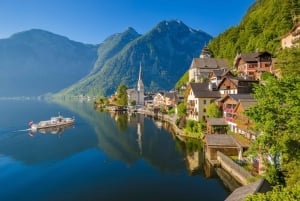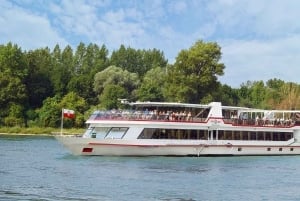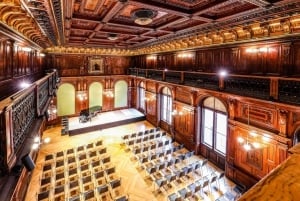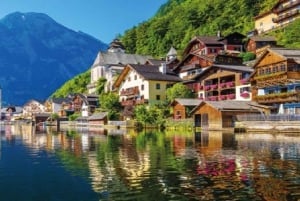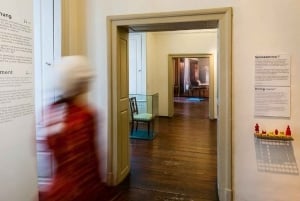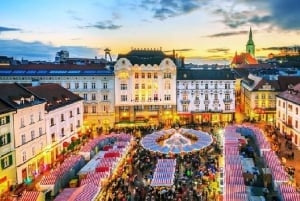Composers Vienna
Classical Music and Vienna are so closely linked - most immediately one thinks of Vienna as the music capital of the world. More famous composers have lived and worked here than in any other city on earth: Mozart, Beethoven, Haydn, Brahms and Schubert, and many more. Vienna started to become known as a central place for music already in the 13th century. But why? The most logical explanation is the central European location that Vienna holds till today. Since before Christianity many trade routes crossed and passed by Vienna bringing cultures and traditions closer to each other as well as prosperity - the entertainment and art world did not stay far behind...
The city has really made a point of honouring the fact that so many composers have lived here, that today Vienna boasts so many famous composer residences, memorials and graves - you can stay busy only visiting these points of interests for a whole week if you want! You might experience that visiting these residences or apartments is not that easy as they are mostly small, hidden and easily overlooked - which is part of their charm! You must know that composers were by no means well-off people, on the contrary, many lived in poverty and were dependant on patronage from aristocracy or other wealthy people.
Wolfgang Amadeus Mozart (1756 - 1791)
Mozart thought of Vienna "as the best city in the world for my career" - it indeed was at that time. Although born in Salzburg and already on his first European music tour at the age of 5, Mozart decided to move to Vienna at the age of 25 and opted for a freelance career here. He lived in the inner city close to St. Peter's Church. After his marriage to Konstanze Weber he moved to what today is called the "Mozarthaus" into a big apartment - he was successful, accepted as a musician and in love. Here he composed many chamber music works, piano concerti and one of his famous operas "Die Hochzeit des Figaro" (Figaro's Marriage). The "good times" passed and Mozart became heavily indebted and sick - he worked very hard to earn money, however, the family had to move into a smaller residence. During this time he composed "Die Zauberflöte" (the magic flute) and his famous Requiem, which he never finished. Mozart suddenly died in December 1791 - because he had no money left he was buried in an "grave of th unknown" at the St. Marx Cementery. Only 60 years later there was a monument erected there in his honour. You will also find a beautiful Mozart memorial in Vienna's Burggarten (park).
Ludwig van Beethoven (1770 - 1827)
Ludwig van Beethoven was by birth German and became a musician while still living in Bonn. Only in 1787 he moved to Vienna to meet and work with like mind composers like himself (Mozart, Haydn, etc...). By then Vienna was the musical capital of the world, attracting everybody interested in making a career in music. In the contrary to Mozart, Beethoven could count on a variety of aristocratic friends and patrons who financed him generously so that he could spend all his time composing music as a free artist. He mostly lived and worked at the "Pasqualati-Haus" or as a guest in his patrons' residences - as a thank you he dedicated many of his works to those families. You can visit his monument right in front of the Konzerthaus.
Quite early in his career, shortly after arriving in Vienna, Beethoven starting getting problems with his hearing - it was an incurable disease at that time. Despite of his handicap he continued to compose fervently and produced the famous "Eroica Symphonie", or the Symphonie No. 5 in Vienna. Beethoven only composed 1 opera called "Fidelio" that was premiered here in 1814. It was only 1818 that he became completely deaf, but he continued composing - and produced the incredible "Choral Symphony, No.9" during this time. Beethoven died during a thunderstorm in 1827 and is today buried at the Vienna Central Cementery (Zentralfriedhof).
Joseph Haydn (1732 - 1809)
Haydn was born 1732 in the Austrian countryside and only arrived in Vienna at the age of 8 - as a choirboy. Although he was educated as a musician and singer he only started composing much later around the age of 30. Haydn was one of the leading musicians in Vienna together with Mozart and Beethoven.
Haydn is known for his important role in the development of symphonies and quartets - often called the father of symphonies or string quartets. The aristocratic family Esterhazy became the main patron of this excellent composer who was one of the most important musicians at his time of death in 1809. His most famous work is the string quartets "Rider" ,the "Emporer Quartet" and the world famous song "God Save The Emperor Franz", which the Germans use as their national anthem.You can visit the charming Haydn Haus where he lived his last 12 years.
Johannes Brahms (1833 - 1897)
Again, Brahms is one of "Vienna's most famous composers" having been born in Hamburg (Northern Germany) and an already a known musician there in his time. He became the Director of the Vienna Singers' Academy in 1862 and therefore moved to the capital of music Vienna that became his second home. Today you can visit the Brahms monument at Karlsplatz, opposite the Musikverein, or the "memorial Brahms room" dedicated to this great composer that is today located in the Haydn House.
Brahms composed for piano, chamber ensembles, symphony orchestra, and for voice and chorus. He was an excellent pianist who premiered many of his own works. Several compositions were never published during his lifetime - being a perfectionist he preferred destroying his work or hiding it rather than having it performed in public. His work includes 4 Symphonies, 2 Serenades, vocal pieces with orchestra and a wide selection of chamber music.
Franz Schubert (1797 - 1828)
Schubert was crazy about music since very early childhood. He studied piano and organ as well as violin and singing. Still in his teenage years he had produced and composed several works of music (piano pieces, string quartets, his first symphony and had even started on an opera). No matter how deep his love for music was, he became a teacher due to the pressure of his parents - the father owned a school in Vienna. Secretly Schubert continued writing and composing music and started frequenting "likemind" artists who got together regularly, and dedicated themselves to make music and songs with Schubert - those evenings became known later as the famous "Schubertiads".
In 1822 Schubert got infected by syphilis and was getting more and more in financial trouble. In any case, Schubert could not stop and continued to create his famous work (i.e. "Eighth Symphony ("unfinished")" and the string Quartet d Minor ("Death and the Maiden"). In his time of death Schubert was one of the most famous songwriters in Vienna, but the work he left to his audience includes much more - Symphonies, String Quartets, piano sonatas, etc.....
Today you can visit both the birthhouse of Schubert, a very picturesque outside the city centre in the midst of the Viennese Woods, where he lived the first 4 years of his life - otherwise his death house, an apartment in Vienna, where Schubert lived as his brother's guest for some weeks before he died in 1828. Also, you can today visit his statue located in the famous Stadtpark.
Johann Strauss Jr. (1825 - 1899)
Who has not heard about the famous Strauss dynasty. Many of the Strauss family members became famous musicians in Vienna, so it is hard to distinguish who we are talking about...Johann Strauss Jr. was the first son of Johann Strauss Sr., a famous Waltzer musician in Vienna himself at that time. Strauss Sr. did not allow his son to have a musical career, but what to do about a music fanatic son who did not bother about school, but only about his violin. Still a teenager he "came out" and performed his first concert as a violinist in a Viennese suburb. The success was overwhelming and this started the bitter competition between father and son.
Despite his feud with his father Strauss Jr. became the Viennese Waltz King in the mid 19th century. He toured Europe and America with his waltzes and was responsible that the waltz became famous all over the world - some even say that he was the first "classical music" star that existed - the Strauss Waltzer became extremely popular!
Later in his life it was the stage that became Strauss Jr's prime interest. He started composing his world famous Operettas (his most famous is the "Fledermaus", or the "Zigeunerbaron") and is now one of THE most famous Austrian operetta composers (performed in Vienna's operetta theatres). Strauss wrote 17 operettas, and sheer endless amount of waltzes - the most famous one (and one that will always immediately be put in "context" with Vienna) being the "Schöne Blaue Donau".
You can visit Strauss' apartment house in the city centre today. Much better known is the famous, golden "Strauss Statue" in the Stadtpark - make sure you are there early enough though, this tiny little monument tends to get overly crowded!


